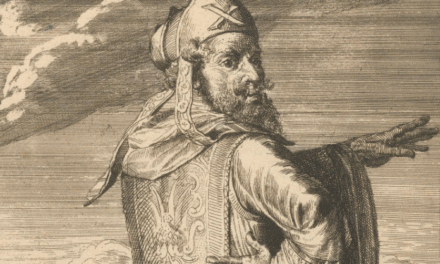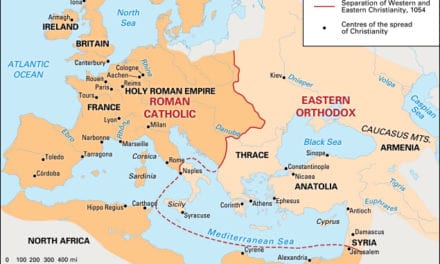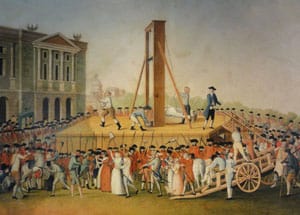This episode is titled, “Striving to Give an Answer”
In his first epistle, the Apostle Peter urged Jesus’ followers to always be ready to give a defense, an apologia, of their faith to anyone who asked. That word meaning an articulate, reasoned position. It was used of the arguments lawyers carried into court to argue their case. Peter added that the Christian must share his/her defense of the Faith, not in a combative or argumentative tone, but with meekness & respect.
If there was any Church Father who sought to embody that command, it was Origen of Alexandria.
Origen was what some might term a “religious fanatic” who gave up his job, slept on the floor, ate no meat, drank no wine, fasted twice a week, owned no shoes, & according to one account castrated himself for the faith. He was also the most prolific scholar of his age, penning hundreds of manuscripts. He was a 1st rate philosopher, & profound student of Scripture.
So outstanding in resisting all the forces that came against him, Origen was nick-named “Adamantius” = man of steel. If that sounds familiar, Adamantine is the metal that makes up Wolverine’s skeleton in the X-Men series. But no! Origen was not a 3rd C Wolverine. à Let’s not get carried away.
A child prodigy, Origen was born near Alexandria in Egypt about AD 185. The oldest of 7 children, he grew up in a Christian home learning the Bible & the meaning of commitment. In 202 his father, Leonidas, was beheaded for the faith in one of those regular rounds of persecution at the hands of hostile Roman officials during the reign of Septimius Severus. The grief stricken 17 year old Origen wanted to join his father as a martyr but his mother prevented him from leaving the house by hiding his clothes.
So; I guess he was willing to DIE in public but not go out naked in it. Sounds like your typical 17 yr old to me.
Origen quickly realized he had more to offer than martyrdom & went to work to support his family. He started a grammar school, copied texts, & instructed new believers in the basics of the faith. While engaged in all this, he himself studied under the pagan philosopher Ammonius Saccas in order to better defend his faith against the arguments of hostile pagans.
As persecution went on, Origen boldly visited the imprisoned, attended their trials, & comforted the condemned. His fame spread & the number of his students increased rapidly. The Bishop of Alexandria at this time was Demetrius, with whom Origen had a hot & cold relationship. There were brief seasons of good will broken by longer periods of antagonism between the two. Origen was by far the sharper intellect & it seems Demetrius was jealous. He demanded Origen limit himself to teaching students issues of doctrine alone. He was not allowed to preach.
Around AD 211-12, during the reign of the Caracalla, Origen visited Rome. The moral looseness he witnessed on the part of Church officials disturbed him. You see, Origen was a confirmed ascetic; committed to self-discipline & an austere lifestyle that shunned anything hinting of a weakening of moral virtue. So on his return to Alexandria he resumed his teaching with a zeal increased by his determination to not follow the example he saw in the capital.
His school had by this time outgrown the strength of a single instructor & administrator. The students clamored for more instruction, & graduates wanted materials to help them study the Bible. Origen brought on others and increasingly devoted himself to the study of the Bible and producing high quality resources. He learned Hebrew so he could get at the text of the OT more efficiently. It was at this time, about 212, that Origen became friends with a wealthy man named Ambrose of Alexandria. Ambrose was a Gnostic whom Origen persuaded to leave his errant views and become a Christian.
Their friendship continued for years, & in appreciation for Origen’s friendship & concern for his soul, Ambrose provided several secretaries to help transcribe Origen’s copious writings. A large number of Origen’s works were dedicated to this friend, Ambrose.
In 214, Origen visited Arabia & the Holy Land. The following year, a popular uprising at Alexandria caused the Emperor Caracalla to allow his soldiers to loot the city. The schools were closed & all foreigners expelled. This meant Ambrose had to leave so Origen went with him. They took refuge in Caesarea on the coast of Israel. Though he wasn’t an ordained priest, the bishops of both Jerusalem & Caesarea asked Origen to carry on a temporary preaching ministry in the local churches.
While this was in line with the practice of the churches in Israel, it was NOT allowed by the Church in Alexandria. When Origen returned there in 216, Bishop Demetrius was furious & tried to limit Origen’s on-going work.
Of his activity over the next decade little is known. He likely engaged mostly in writing & the instruction of new believers.
Origen understood the threat being posed by Gnosticism. He also knew when Gnosticism finally disappeared, another error would rise to replace it. The only way to deal with the sure coming waves of heretical challenge was to provide tools for believers to use to study & understand the Bible. To that end he produced the Hexapla, an early form of what we know today as a Parallel Bible. The Hexapla had the original Hebrew text of the OT, a Greek, transliteration & several other Grk translations. All arranged in 6 parallel columns. One of these Greek translations he found in a jar in the city of Jericho. This was a massive undertaking and required 28 years to complete. The Hexapla obviously became an important part of the development of the NT canon & helped shape scriptural translation. Unfortunately it was lost. It was so massive modern scholars doubt anyone ever copied it entirely. We know of its existence because portions of it exist, and it’s referenced in several comments by contemporary Christians.
Origen might rightly be called the 1st Bible scholar who analyzed the Scriptures on 3 levels: the literal, the moral, and the allegorical. As Origen himself put it, “For just as man consists of body, soul, and spirit, so in the same way does Scripture.” In truth, Origen preferred the allegorical because it allowed for more spiritual interpretations. There were many passages he considered impossible to understand literally.
Origen’s method of allegorical interpretation became the standard for Bible study of later church ages, and would end up leading people pretty far astray.
Origen’s main work, was De Principiis = On First Principles. It was the first systematic exposition of Christian theology ever written. He created a distinctly Christian philosophy by synthesizing Greek techniques of analysis with Biblical texts. Add to these the 2 massive works of the Hexapla & De Principiis, his homilies & commentaries, and it’s clear how he kept 7 secretaries busy and caused the later church father Jerome to say in frustrated admiration, “Has anyone read everything Origen wrote?”
While what we’ve looked at so far makes Origen out to be a pretty solid guy, he wasn’t without warts. In fact, one of the later Church Councils will go so far as to label Origen a heretic.
But hang on; as we’ll see, those councils weren’t always the most unbiased and righteous courts of discernment. Far from it!
It was Origen’s interpretation of Scripture that got him into hot water. He advocated the idea that the real meaning of a text wasn’t its straight-forward, literal reading but that Scripture had an allegorical meaning & THAT was the primary purpose of the text. Finding the allegorical key was the main point, Origen and his followers, claimed.
While there is certainly some deep allegory to some of Scripture, the vast majority of the Biblical text ought to be understood literally. But those who followed Origen took his idea of allegory too far and made allegory the main interpretive method for all of Scripture. This methodology of Bible study held sway for hundreds of years & ended up countering the very thing Origen had set out to do – make the Bible accessible to all believers. For in the allegorical method of interpretation, only those educated in the often esoteric symbols of the Allegoricalists can rightly interpret & understand the Word of God.
Another thing that Origen did which had a negative effect on the Church was his fanatical dedication to self-denial. Origen was so anxious to present himself to God as holy he engaged in practices that were surely aberrant. It was this fastidious devotion to asceticism that encouraged the monastic movement of later times. He denied himself sleep, engaged in extreme fasting, & went barefoot.
There’s one aspect of Origen’s asceticism that bears recounting because modern students of church history often hear only a partial story. A fuller report is warranted as it illustrates how more knowledge on a subject often sheds a very different light on the how & why of things the ancients did.
So – Origen’s great zeal for holiness moved him when he was young & immature to castrate himself.
Yes, you heard me correctly; he castrated – HIMSELF! è Ouch!!!!!!!
His motive was to avoid any potential for scandal because of his instruction of women. Now this is interesting, because though Origen later developed an allegorical method of interpretation, when he was younger he took Matthew 19:12 pretty literally when it said; “There are those who have made themselves eunuchs for the sake of the kingdom of heaven.”
The early church historian Eusebius says Origen’s self-castration was “proof of an inexperienced and youthful heart but also of faith and self-control.”
It seems Origen later thought better of his youthful act. In his Commentary on Matthew he condemned those who took 19:12 literally, and said such an action was an “outrage.” Based on this, modern skeptics contend the report of Origen’s self-castration is false. But Origen goes on in his writings to speak of the physical problems resulting from castration in a way that suggests personal experience.
This isn’t all that got Origen into trouble with later church leaders. While some of his writings were surely hypothetical, Origen taught the pre-existence of the soul; that a person’s spirit existed before conception, & that all spirits had fallen into sin before birth. Furthermore, he said these sinful spirits were then enslaved in bodies in proportion to the grievousness of the sins they committed. So some were made demons, some men, & some angels. He also believed all spirits could be saved, even satan.
But what got Origen into the biggest trouble doctrinally was his description of the Trinity. He said it was a hierarchy where Father, Son, and Spirit were NOT equal. Though he attacked Gnostic beliefs, like them, he rejected the goodness of material creation.
Three centuries after his death, the Council of Constantinople pronounced Origen a heretic. But try to file that little factoid away for later because we’re going to spend quite a bit of time on this topic of the church debates over the Trinity & the nature of Christ in upcoming episodes. The 4th & 5th Cs were dominated by these debates & while the issue is largely settled for us today, we really ought to have a better appreciation for the agony the church endured for 200 years as church elders tried to figure all this out.
The question is: Did Origen REALLY mean Father, Son & Spirit weren’t equal, thus making him a genuine heretic? Of by referring to them as a hierarchy, was he speaking of their submission to each other in the relational matrix of the Trinity?
Ah—there’s the rub. In order to answer that, we need to know what Origen and later writers meant by the WORDS they used to describe what they believed. And that’s not always an easy task – especially when someone like Origen was oblivious to the arguments and debates that would rage 2 & 300 years later.
Many scholars now contend Origen was merely trying to frame the Faith in the ideas of his day. But after the Council of Constantinople his works were suppressed; many of them being rounded up and burned, making modern evaluation difficult.
Origen’s Against Celsus is one of the finest defenses of Christianity produced in the early church. Answering the charge that Christians, by refusing military service, failed the test of good citizenship, he wrote, “We who by our prayers destroy all demons which stir up wars, violate oaths, and disturb the peace are of more help to the emperors than those who seem to be doing the fighting.”
The authorities weren’t convinced. In AD 250 the Emperor Decius had Origen imprisoned and tortured. He was deliberately kept alive in hope he’d renounce his faith. But Decius died first and Origen was set free. His health broken, he died shortly after his release.






